A gauge of global stock markets climbed for a third straight session on Thursday to hit its highest level in two weeks, as a dip in government bond yields helped curb inflation concerns and give a boost to equities.
Euro zone bond yields fell after the European Central Bank said it was ready to accelerate money-printing to keep a lid on euro zone borrowing costs, using its 1.85 trillion euro Pandemic Emergency Purchase Program (PEPP) more generously over the coming months to stop any unwarranted rise in debt financing costs.
Germany’s 10-year government bond yield was last at -0.333%, after falling as far as -0.367%, the lowest level since Feb. 18 and further away from the near one-year high of -0.203% in late February.
The yield on the benchmark 10-year Treasury note fell as low as 1.475%, the first time it had dipped below 1.5% in a week. It last fell 2/32 in price to yield 1.5266%, from 1.52% late on Wednesday.
On Wall Street, the easing inflation worry helped support equities, with the highly valued technology sector leading the way higher, up 2.12%. Expensive stocks, many of which are in the tech sector, have been highly sensitive to the rise in yields.
In contrast, shares of bank stocks lost 0.47%. Still, while the Dow and S&P 500 closed at record highs, the tech-heavy Nasdaq paced the gains, rising more than 2% on the day.
“A lot of it depends on rates, a lot of it depends on that initial prick that started that transition from large cap tech to the rest of the market and small caps,” said Keith Buchanan, senior portfolio manager at Globalt Investments in Atlanta.
“If rates continue to trend higher that trend will continue, if rates kind of stall out like they have over the next couple of days then we could have a back and forth that hopefully isn’t as volatile as it has been the last couple of days, but we should expect there is going to be a lot of action.”
The Dow Jones Industrial Average rose 188.57 points, or 0.58%, to 32,485.59, the S&P 500 gained 40.46 points, or 1.04%, to 3,939.27 and the Nasdaq Composite added 329.84 points, or 2.52%, to 13,398.67.
Sentiment was also boosted by weekly jobless claims data, which pointed to a recovering U.S. labor market as vaccine rollouts have helped lead to economic reopenings.
European stocks climbed, with the pan-European STOXX 600 higher for a fourth straight day, its longest winning streak in five weeks, with the index closing at its highest level since Feb. 21, 2020. The STOXX 600 index rose 0.49% and MSCI’s gauge of stocks across the globe gained 1.37%.
An auction of 30-year U.S. debt on Thursday was viewed as slightly weak, but nowhere near the disappointing seven-year auction in late February that helped fuel inflation concerns and sent yields higher.
Analysts largely expect inflation to pick up as vaccine rollouts lead to a reopening of the economy, but worries persist that additional stimulus in the form of a $1.9 trillion coronavirus relief package set to be signed by U.S. President Joe Biden could overheat the economy.
The dollar was weaker for a third straight day coming off a 3-1/2-month high of 92.506 on Tuesday. The dollar index fell 0.48%, with the euro up 0.52% to $1.1987.
Oil prices resumed their climb following two days of declines, buoyed by the brightening economic outlook and a decline in the dollar.
U.S. crude settled up 2.5% at $66.02 per barrel and Brent was at $69.63, up 2.6% on the day.

